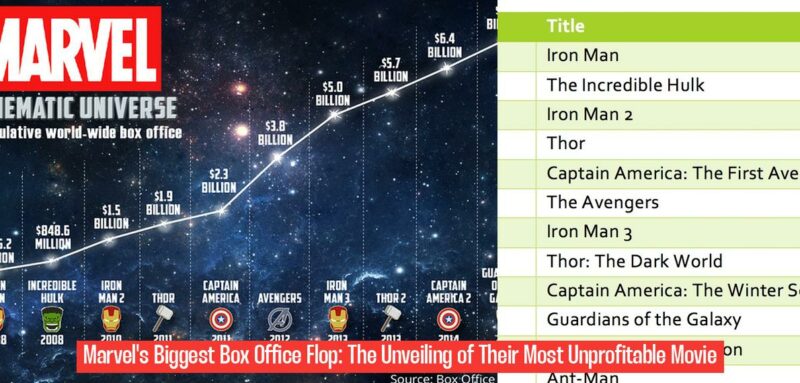Unveiled: Marvel’s Most Unprofitable Movie
Just a few years ago, Marvel Studios seemed invincible. They churned out hit after hit, each film based on a beloved comic book character, culminating in the record-breaking success of Avengers: Endgame in 2019, which raked in a staggering $2.8 billion at the box office. But as the saying goes, “the bigger they are, the harder they fall.” The pandemic, a global crisis that shook the world, dealt a significant blow to even the mighty Marvel.
While the rise of the Disney+ streaming platform initially seemed like a saving grace for Marvel, it ultimately contributed to their downfall. The pandemic forced people to stay indoors, boosting subscription numbers for streaming services like Disney+. Marvel, with its pre-pandemic foresight, had already begun producing streaming content, starting with the Emmy-winning show, WandaVision, which seamlessly integrated into the Marvel Cinematic Universe (MCU).
— Harvey Guillén Discusses Joining the DC Universe in Upcoming Blue Beetle Movie: io9 Interview
However, Disney’s ambitious plan to dethrone Netflix as the streaming giant led to an oversaturation of content, including unnecessary sequels. This resulted in a deluge of Marvel productions that overwhelmed viewers. The abundance of content made it difficult to keep up, and missing one episode or movie could lead to confusion and disinterest in the subsequent releases.
The pandemic’s impact on production further complicated matters. Remote work became the norm, making it challenging for Disney to control leaks. Entire plots of Marvel movies began appearing online before their theatrical releases, diminishing the element of surprise. To keep the content flowing, Marvel delved into the depths of their archives, producing shows and movies based on obscure characters that many fans didn’t care about.
The Rise and Fall of Eternals
Eternals, released in 2021, serves as a prime example of this trend. The movie, featuring a team of human-looking aliens from the planet Olympia, was met with lukewarm reception. Its convoluted plot, involving a millennia-long war between the Eternals and the Deviants, both creations of a powerful ancient race called the Celestials, failed to resonate with audiences.
The movie was a critical and commercial disappointment, becoming the first Marvel film to be labeled “Rotten” on the review aggregator Rotten Tomatoes. Even dedicated Marvel fans were unimpressed, and the movie’s box office gross fell short of almost all its MCU predecessors, reaching only $402.1 million, according to Box Office Mojo.
Eternals marked the beginning of a downward trend for Marvel, with subsequent productions exhibiting a similar sci-fi theme, suggesting a depletion of fresh ideas. Marvel, it seemed, had lost its magic touch.
A String of Disappointing Releases
The year 2022 saw a string of disappointing releases, confirming Marvel’s decline. Ant-Man and the Wasp: Quantumania, set in an alien world, earned the dubious distinction of being Marvel’s lowest-rated sequel on Rotten Tomatoes, with a critics score of only 46%.
Secret Invasion, a Disney+ series about shape-shifting aliens infiltrating the government, was another misstep. Despite its staggering $211.6 million production cost, the finale garnered a dismal 7% on Rotten Tomatoes, making it the lowest-rated episode of any Marvel streaming series.
The decline in quality didn’t escape the notice of Bob Iger, Disney’s chief executive. “Quantity, in our case, diluted quality and Marvel has suffered greatly from that,” he admitted during The New York Times’ DealBook Summit in November 2022.
The Marvels: A Costly Misfire
Iger pointed a finger at his executives for failing to provide adequate oversight on The Marvels, a space-based superhero movie and sequel to the 2019 hit Captain Marvel. The movie, featuring a trio of female heroes battling an alien antagonist played by Zawe Ashton, aimed for a message of diversity but fell short in terms of representation behind the scenes.
The Marvels failed to captivate audiences, earning a paltry $206.1 million at the box office. With theaters taking 50% of box office revenues, Disney ended up with only half of the earnings. Iger expressed his disappointment with the movie’s performance, attributing it to a lack of supervision during its production, which took place during the pandemic.
Financial statements filed by the Disney production company in the UK revealed that The Marvels cost a staggering $221.7 million (£177.4 million) to make as of September 30, 2022, resulting in a box office loss of $118.6 million. This loss is likely to increase as the movie was released 13 months after the date of the financial statements.
The Marvels: A Record-Breaking Loss
The Marvels holds the unfortunate record of being the biggest financial loss for an MCU movie made in the UK. The loss is so substantial that it almost equals Marvel’s net spending on Captain America: The First Avenger, released in 2011.
Quantumania also incurred a loss of $39.3 million, based on its total costs two months before its release. Similarly, Eternals suffered a loss of $61.1 million. Combined, the three movies account for a staggering $219 million deficit.
In stark contrast, before the pandemic, every Marvel movie made in the UK turned a profit. Doctor Strange in the Multiverse of Madness was the only profitable Marvel movie since the pandemic, generating a $127.3 million profit in 2022. However, this pales in comparison to the colossal profits generated by Endgame and its prequel, Avengers: Infinity War, which yielded a combined profit of $1.2 billion.
A Shift in Strategy
The financial downturn has prompted a shift in strategy for Marvel. A sequel to The Marvels has reportedly been shelved, and Iger has acknowledged that Disney has produced “too many” sequels that haven’t been well-received by fans and critics.
“Often, the story is not as strong as the original story. That can be a problem but it just has to have a reason. You have to have a reason to make it beyond commerce,” he said. “There has to be an artistic reason to make it, and we’ve made too many.”
With over half of the Marvel movies currently in production being sequels, it remains to be seen whether the studio has learned its lesson and can successfully navigate its way out of its current predicament. The future of Marvel, once a cinematic juggernaut, hangs in the balance.
What factors contributed to Marvel Studios’ downfall?
The pandemic and oversaturation of content due to Disney’s streaming platform contributed to Marvel Studios’ downfall.
What impact did the pandemic have on Marvel’s production and viewership?
The pandemic led to leaks of Marvel movie plots, an oversaturation of content, and confusion among viewers due to the abundance of releases.
Which Marvel movie serves as an example of the studio’s loss-making trend?
Eternals, released in 2021, is a prime example of Marvel’s loss-making trend due to its lukewarm reception and commercial disappointment.
What milestone did Eternals achieve as a Marvel film?
Eternals became the first Marvel film to be labeled “Rotten” on the review aggregator Rotten Tomatoes due to its critical and commercial disappointment.



